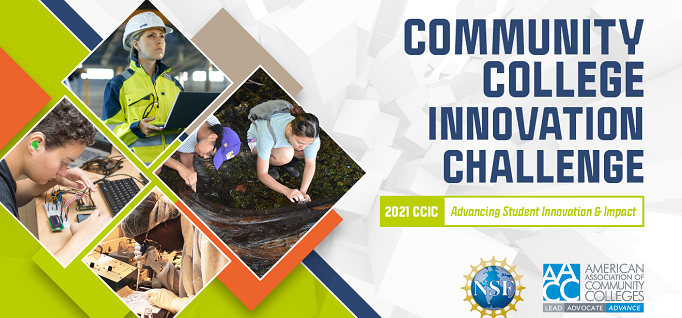Advancing student innovation and impact
By Madeline Patton
March 18, 2021
A competition allows students to find STEM solutions to real-world problems and sharpen entrepreneurial skills.
The Community College Innovation Challenge offers an extraordinary opportunity for students to delve in to science, technology, engineering and math (STEM) solutions to real-world problems.
The challenge – a competition open exclusively to teams that community college students form with faculty or administrator mentors – is led by the American Association of Community Colleges in partnership with the National Science Foundation.
In addition to sharpening their entrepreneurial skills, CCIC contestants are eligible for cash prizes of up to $3,000 per team member. First, second and third place prizes will be awarded based on CCIC finalist teams’ presentations at a virtual student innovation showcase for STEM leaders and Congressional stakeholders and teams’ pitch presentations to esteemed industry professionals. These events culminate the Virtual Innovation Boot Camp that finalists will attend from June 14 to 17.
Previous CCIC finalists have praised the boot camp as a dynamic experience where they learned from entrepreneurs, business development professionals, and other contestants in an encouraging environment.
Reavelyn Pray reported that CCIC boosted her confidence: “CCIC was a huge validation for someone like myself who came from nothing, was never told could be anything. I am a single mother with two kids and a passion for research in biotechnology but many times I doubt my abilities and ideas. One day I hope to use my passion to direct translational research and bring biotechnology to market for the greater good.” Since competing in the CCIC, Pray has earned an associate degree in biotechnology at Del Mar College (Texas) and a bachelor’s degree in cellular and molecular biology at Texas A&M University-Corpus Christi. She is now a research associate at Natera.
“My career journey is just beginning, of course, but already I can see how my time with CCIC and NSF has altered my trajectory,” Dallas Elleman wrote on a survey shortly after competing in the CCIC. He has since earned associate degrees in electrical engineering, physics, and mathematics from Tulsa Community College (Oklahoma) and a bachelor’s degree in engineering and physics from the University of Tulsa. He is currently a product development engineer at XWorks, Corporation.
April 20 is the deadline for teams to submit their written entries and 90-second video descriptions of their ideas to address local or global problems. Up to 10 finalists teams will be announced in early May. In the second phase of the CCIC teams will explore the viability of their solutions with potential customers, and during the Virtual Innovation Boot Camp they will learn how to showcase their innovations with lessons on communication strategies, design-centered thinking, and brand-development processes. For more information and to apply, click here.



